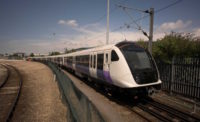The U.K. government has failed to justify its planned $74-billion investment in HS2, a new high-speed railroad that will link London to industrial centers in the north of England, according to a March 25 report from an influential committee of Parliament. The report calls on officials to make a better case for “one of the most expensive infrastructure projects ever undertaken in the U.K.”
Clive Hollick, chair of the House of Lords Economic Affairs Committee, said, "Parliament should not approve the enabling legislation that will allow HS2 work to begin until we have satisfactory answers to these key questions.” Draft legislation aimed at granting all necessary powers to start the first phase of HS2 is now going through the parliamentary process, which may conclude early next year.
As now planned, the first phase would provide a line between London and Birmingham, which is nearly 200 kilometers to the northwest. A second phase, starting six years later, would extend the railroad by 189 km, to Leeds, and 153 km, to Manchester.
However, according to the committee, the government has not yet made “a convincing case” for either of its two main objectives: boosting railroad capacity and geographically rebalancing the economy.
The government has withheld its full data on railroad usage on the grounds of commercial sensitivity, according to the committee. To raise capacity, less expensive options exist but “have not been properly reviewed,” says the report.
In terms of distributing economic activity away from London, the project would be counterproductive, the report suggests. Evidence from other countries, such as France, shows the capital city "is the biggest beneficiary from high-speed rail,” notes the report. It said other options would generate more growth, such as "regional transport links between cities outside London."
“The case for HS2 is crystal clear,” responds a Dept. for Transport spokesman. With demand for long-distance rail travel predicted to double in 15 years, the spokesman says, “it is crucial we press ahead with delivering HS2 on time and budget, and we remain on track to start construction in 2017.”
HS2 Ltd., the government company managing the project, already has started site investigations along the route. But its main focus is “to get the ball rolling in a really serious way on procurement,” says a spokesman. The company plans to start procuring some $15 billion of construction later this year.



Post a comment to this article
Report Abusive Comment